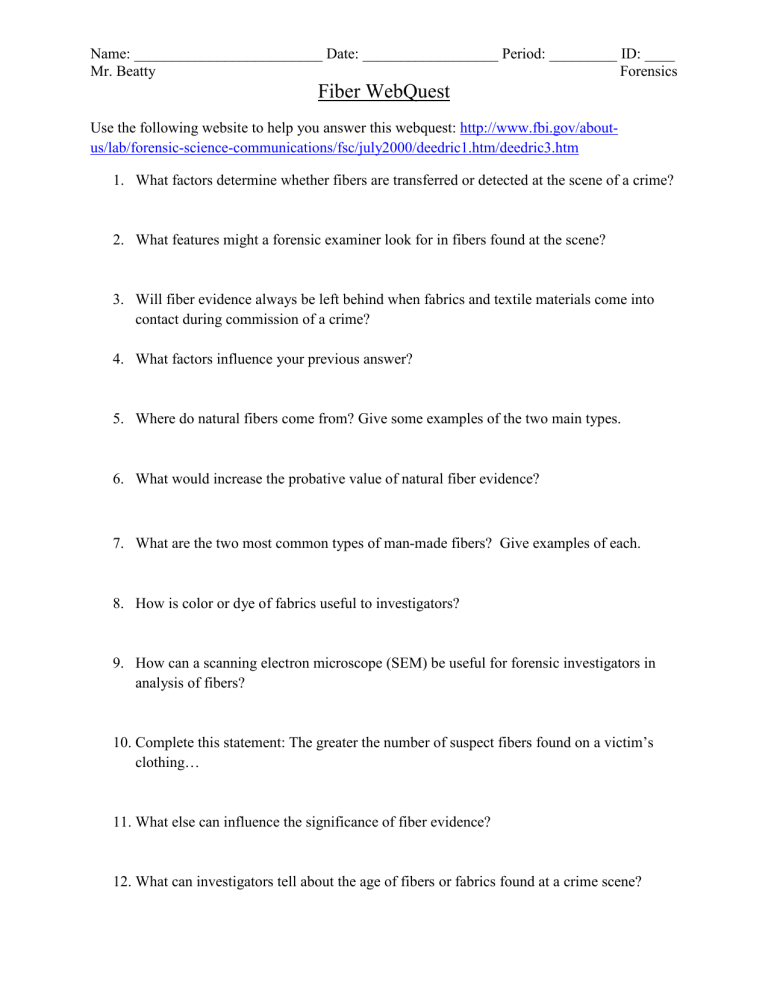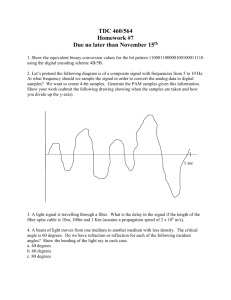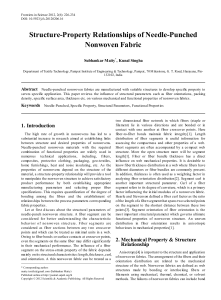
Name: _________________________ Date: __________________ Period: _________ ID: ____ Mr. Beatty Forensics Fiber WebQuest Use the following website to help you answer this webquest: http://www.fbi.gov/aboutus/lab/forensic-science-communications/fsc/july2000/deedric1.htm/deedric3.htm 1. What factors determine whether fibers are transferred or detected at the scene of a crime? 2. What features might a forensic examiner look for in fibers found at the scene? 3. Will fiber evidence always be left behind when fabrics and textile materials come into contact during commission of a crime? 4. What factors influence your previous answer? 5. Where do natural fibers come from? Give some examples of the two main types. 6. What would increase the probative value of natural fiber evidence? 7. What are the two most common types of man-made fibers? Give examples of each. 8. How is color or dye of fabrics useful to investigators? 9. How can a scanning electron microscope (SEM) be useful for forensic investigators in analysis of fibers? 10. Complete this statement: The greater the number of suspect fibers found on a victim’s clothing… 11. What else can influence the significance of fiber evidence? 12. What can investigators tell about the age of fibers or fabrics found at a crime scene? Name: _________________________ Date: __________________ Period: _________ ID: ____ Mr. Beatty Forensics 13. How can investigators determine the source of a particular fiber or fabric? 14. What is the difference between direct and indirect transfer? Where have we heard of this before? 15. Transferred fibers are lost rather quickly depending on the type of fabric involved in the transfer. Why does this rule not necessarily apply for homicide victims? 16. What must be done to ensure preservation of this fiber evidence? 17. What two possible explanations can be derived from matching fibers to a source? 18. If a fiber did come from one particular source, what must be true? 19. Why must investigators use the term “consistent with” rather than “came from” when referring to fiber “matches”? 20. Does the inability to positively associate a fiber with a particular garment to the exclusion of all other garments make fiber evidence worthless? 21. What is the likelihood of two or more manufacturers duplicating all aspects of the fabric type and color exactly? 22. What is the importance of “coincidence” in fiber examination? 23. Use the following symbols to indicate the items in the pairs with the most probative value. (>, <, =) 1. Blue denim white cotton 2. White cotton dyed orange polyester 3. Black cotton purple rayon 4. Purple wool natural wool






